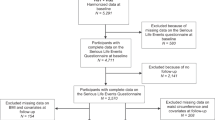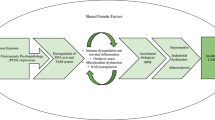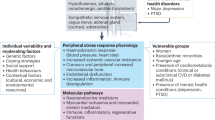Abstract
Several studies have reported a positive association between psychological stress and cardiovascular diseases; however, there is scarce evidence about various aspects of life stress, including traumatic, positive, and negative events. We aimed to evaluate the association between various stressful life events and indicators of cardiovascular risk, including the augmentation index. A total of 3276 participants from the Cardiovascular and Metabolic Diseases Etiology Research Center cohort (Mean age: 50.9) were analyzed cross-sectionally. By using the Life Experience Questionnaire, exposures were grouped as a “positive event,” “negative event,” or “traumatic event.” The augmentation index and subclinical atherosclerosis were measured. Multivariate polytomous logistic regression was used. Overall, stressful life events did not show any significant association with any cardiovascular index; however, increased odds ratios were observed between augmentation index quartiles and those who had experienced traumatic events (quartile 4: odds ratio = 1.41, 95% confidence interval = 1.09–1.82). The association remained valid among women when stratified by sex. There was no significant result in men. Traumatic events in women were positively associated with the augmentation index. These findings suggest that more attention should be paid to trauma in the context of increased cardiovascular risk in women.
This is a preview of subscription content, access via your institution
Access options
Subscribe to this journal
Receive 12 print issues and online access
$259.00 per year
only $21.58 per issue
Buy this article
- Purchase on Springer Link
- Instant access to full article PDF
Prices may be subject to local taxes which are calculated during checkout

Similar content being viewed by others
References
Dimsdale JE. Psychological stress and cardiovascular disease. J Am Coll Cardiol. 2008;51:1237–46.
Korkeila J, Vahtera J, Korkeila K, Kivimäki M, Sumanen M, Koskenvuo K, et al. Childhood adversities as predictors of incident coronary heart disease and cerebrovascular disease. Heart. 2010;96:298–303.
Rich-Edwards JW, Mason S, Rexrode K, Spiegelman D, Hibert E, Kawachi I, et al. Physical and sexual abuse in childhood as predictors of early-onset cardiovascular events in women. Circulation. 2012;126:920–7.
Everson-Rose SA, Lewis TT. Psychosocial factors and cardiovascular diseases. Annu Rev Public Health. 2005;26:469–500.
Gullette EC, Blumenthal JA, Babyak M, Jiang W, Waugh RA, Frid DJ, et al. Effects of mental stress on myocardial ischemia during daily life. JAMA. 1997;277:1521–6.
Cameron A, Palm K, Follette V. Reaction to stressful life events: what predicts symptom severity? J Anxiety Disord. 2010;24:645–9.
Furniss T, Beyer T, Müller JM. Impact of life events on child mental health before school entry at age six. Eur child Adolesc psychiatry. 2009;18:717–24.
Hendrickson CM, Neylan TC, Na B, Regan M, Zhang Q, Cohen BE. Lifetime trauma exposure and prospective cardiovascular events and all-cause mortality: findings from the Heart and Soul Study. Psychosom Med. 2013;75:849–55.
Sumner JA, Kubzansky LD, Elkind MS, Roberts AL, Agnew-Blais J, Chen Q, et al. Trauma exposure and posttraumatic stress disorder symptoms predict onset of cardiovascular events in women. Circulation. 2015;132:251–9.
Rozanski A, Blumenthal JA, Kaplan J. Impact of psychological factors on the pathogenesis of cardiovascular disease and implications for therapy. Circulation. 1999;99:2192–217.
Rozanski A, Bairey CN, Krantz DS, Friedman J, Resser KJ, Morell M, et al. Mental stress and the induction of silent myocardial ischemia in patients with coronary artery disease. New Engl J Med. 1988;318:1005–12.
Wittstein IS, Thiemann DR, Lima JA, Baughman KL, Schulman SP, Gerstenblith G, et al. Neurohumoral features of myocardial stunning due to sudden emotional stress. New Engl J Med. 2005;352:539–48.
Laurent S. European network for non-invasive investigation of large arteries. Expert consensus document on arterial stiffness: methodological issues and clinical applications. Eur Heart J. 2006;27:2588–605.
Yannoutsos A, Ahouah M, Tubiana CD, Topouchian J, Safar ME, Blacher J. Aortic stiffness improves the prediction of both diagnosis and severity of coronary artery disease. Hypertens Res. 2018;41:118–25.
Boutouyrie P, Bussy C, Lacolley P, Girerd X, Laloux B, Laurent S. Association between local pulse pressure, mean blood pressure, and large-artery remodeling. Circulation. 1999;100:1387–93.
Bomhof-Roordink H, Seldenrijk A, van Hout HP, van Marwijk HW, Diamant M, Penninx BW. Associations between life stress and subclinical cardiovascular disease are partly mediated by depressive and anxiety symptoms. J Psychosom Res. 2015;78:332–9.
OECD. Health at a glance 2013: OECD Indicators, OECD Publishing, Paris. https://doi.org/10.1787/health_glance-2013-en. 2013.
Shim JS, Song BM, Lee JH, Lee SW, Park JH, Choi DP, et al. Cardiovascular and metabolic diseases etiology research center (CMERC) cohort: study protocol and results of the first 3 years of enrollment. Epidemiol Health. 2017;39:e2017016.
Sarason IG, Johnson JH, Siegel JM. Assessing the impact of life changes: development of the Life Experiences Survey. J consulting Clin Psychol. 1978;46:932.
Lee Y-H. Relations between attributional style, life events, event attribution, hopelessness and depression. Unpublished doctoral dissertation. Seoul: Seoul National University. 1993.
Morgan CA III, Hazlett G, Wang S, Richardson EG Jr, Schnurr P, Southwick SM. Symptoms of dissociation in humans experiencing acute, uncontrollable stress: a prospective investigation. Am J Psychiatry. 2001;158:1239–47.
Schnurr P, Vielhauer M, Weathers F, Findler M. The brief trauma questionnaire. White River Junction, VT: National Center for PTSD. 1999.
Kim M, Lee I, Lee C. In female university students sample= the validation study 1 of Korean BDI-2. Korean J Clin Psychol. 2007;26:997–1014.
Weber T, Auer J, O’rourke MF, Kvas E, Lassnig E, Berent R, et al. Arterial stiffness, wave reflections, and the risk of coronary artery disease. Circulation. 2004;109:184–9.
Wilkinson IB, Prasad K, Hall IR, Thomas A, MacCallum H, Webb DJ, et al. Increased central pulse pressure and augmentation index in subjects with hypercholesterolemia. J Am Coll Cardiol. 2002;39:1005–11.
Duprez DA, Kaiser DR, Whitwam W, Finkelstein S, Belalcazar A, Patterson R, et al. Determinants of radial artery pulse wave analysis in asymptomatic individuals. Am J hypertension. 2004;17:647–53.
Kelly R, Hayward C, Avolio A, O’rourke M. Noninvasive determination of age-related changes in the human arterial pulse. Circulation. 1989;80:1652–9.
Lee JH, Choi DP, Shim J-S, Kim DJ, Park S-H, Kim HC. Inter-rater reliability of carotid intima-media thickness measurements in a multicenter cohort study. J Health Info Stat. 2016;41:49–56.
Gkaliagkousi E, Douma S. The pathogenesis of arterial stiffness and its prognostic value in essential hypertension and cardiovascular diseases. Hippokratia. 2009;13:70.
Ahn KT, Park K-I, Kim MJ, Oh JK, Han JH, Kwon HJ, et al. Height and sex is strongly associated with radial augmentation index in Korean patients with never-treated hypertension. Clin Interventions Aging. 2016;11:415.
Kanner AD, Coyne JC, Schaefer C, Lazarus RS. Comparison of two modes of stress measurement: daily hassles and uplifts versus major life events. J Behav Med. 1981;4:1–39.
Brugha TS, Cragg D. The list of threatening experiences: the reliability and validity of a brief life events questionnaire. Acta Psychiatr Scand. 1990;82:77–81.
Dong M, Giles WH, Felitti VJ, Dube SR, Williams JE, Chapman DP, et al. Insights into causal pathways for ischemic heart disease: adverse childhood experiences study. Circulation. 2004;110:1761–6.
Jern S, Pilhall M, Jern C, Carlsson SG. Short-term reproducibility of a mental arithmetic stress test. Clin Sci. 1991;81:593–601.
Vlachopoulos C, Kosmopoulou F, Alexopoulos N, Ioakeimidis N, Siasos G, Stefanadis C. Acute mental stress has a prolonged unfavorable effect on arterial stiffness and wave reflections. Psychosom Med. 2006;68:231–7.
Seldenrijk A, Van Hout HP, van Marwijk HW, de Groot E, Gort J, Rustemeijer C, et al. Carotid atherosclerosis in depression and anxiety: associations for age of depression onset. World J Biol Psychiatry. 2011;12:549–58.
DeCara JM. Carotid intima-media thickness and risk for coronary heart disease. Curr Cardiovascular Imaging Rep. 2009;2:350.
Onete V, Henry RM, Sep SJS, Koster A, van der Kallen CJ, Dagnelie PC, et al. Arterial stiffness is associated with depression in middle-aged men - the Maastricht Study. J Psychiatr Neurosci. 2018;43:111–9.
Laurent S, Kingwell B, Bank A, Weber M, Struijker-Boudier H. Clinical applications of arterial stiffness: Therapeutics and pharmacology. Am J Hypertension. 2002;15:453–8.
Low CA, Salomon K, Matthews KA. Chronic life stress, cardiovascular reactivity, and subclinical cardiovascular disease in adolescents. Psychosom Med. 2009;71:927.
Gold SD, Marx BP, Soler-Baillo JM, Sloan DM. Is life stress more traumatic than traumatic stress? J Anxiety Disord. 2005;19:687–98.
Van Hooff M, McFarlane AC, Baur J, Abraham M, Barnes DJ. The stressor Criterion-A1 and PTSD: a matter of opinion? J Anxiety Disord. 2009;23:77–86.
Edmondson D, Cohen BE. Posttraumatic stress disorder and cardiovascular disease. Prog Cardiovasc Dis. 2013;55:548–56.
Gill JM, Saligan L, Woods S, Page G. PTSD is associated with an excess of inflammatory immune activities. Perspect Psychiatr Care. 2009;45:262–77.
Brudey C, Park J, Wiaderkiewicz J, Kobayashi I, Mellman TA, Marvar PJ. Autonomic and inflammatory consequences of posttraumatic stress disorder and the link to cardiovascular disease. Am J Physiol Regul Integr Comp Physiol. 2015;309:R315–R321.
Phillips AC, Carroll D, Ring C, Sweeting H, West P. Life events and acute cardiovascular reactions to mental stress: a cohort study. Psychosom Med. 2005;67:384–92.
Boyce WT, Chesterman E. Life events, social support, and cardiovascular reactivity in adolescence. J Dev Behav Pediatr. 1990;11:105–11.
Musante L, Treiber FA, Kapuku G, Moore D, Davis H, Strong WB. The effects of life events on cardiovascular reactivity to behavioral stressors as a function of socioeconomic status, ethnicity, and sex. Psychosom Med. 2000;62:760–7.
Jorgensen RS, Houston BK. Reporting of life events, family history of hypertension, and cardiovascular activity at rest and during psychological stress. Biol Psychol. 1989;28:135–48.
Seelig AD, Rivera AC, Powell TM, Williams EC, Peterson AV, Littman AJ, et al. Patterns of smoking and unhealthy alcohol use following sexual trauma among US Service members. J Trauma Stress. 2017;30:502–11.
Vlachopoulos C, Alexopoulos N, Stefanadis C. Lifestyle modification and arterial stiffness and wave reflections: a more natural way to prolong arterial health. Artery Res. 2006;1:S15–S22.
Faggiano A, Pivonello R, Spiezia S, De Martino MC, Filippella M, Di Somma C, et al. Cardiovascular risk factors and common carotid artery caliber and stiffness in patients with Cushing’s disease during active disease and 1 year after disease remission. J Clin Endocrinol Metabol. 2003;88:2527–33.
Funding
This research was supported by the Basic Science Research Program through the National Research Foundation of Korea (NRF), funded by the Ministry of Science and ICT (grant number 2018R1C1B5083722) and the Korea Health Technology R&D Project through the Korea Health Industry Development Institute (KHIDI), funded by the Ministry of Health & Welfare, Republic of Korea (grant number HI13C0715).
Author information
Authors and Affiliations
Corresponding author
Ethics declarations
Conflict of interest
The authors declare that they have no conflict of interest.
Ethics
The protocol of this study was approved by the Institutional Review Board of Yonsei University (YUIRB- 4-2013-0661), and written informed consent was provided by all participants. All procedures in this work complied with the ethical standards of the relevant national and institutional committees on human experimentation and with the Helsinki Declaration of 1975, as revised in 2008.
Additional information
Publisher’s note Springer Nature remains neutral with regard to jurisdictional claims in published maps and institutional affiliations.
Supplementary information
Rights and permissions
About this article
Cite this article
Jung, S.J., Jeon, Y., Lee, G. et al. Stressful life events and augmentation index: results from the Cardiovascular and Metabolic Diseases Etiology Research Center. Hypertens Res 43, 45–54 (2020). https://doi.org/10.1038/s41440-019-0331-6
Received:
Revised:
Accepted:
Published:
Issue Date:
DOI: https://doi.org/10.1038/s41440-019-0331-6



